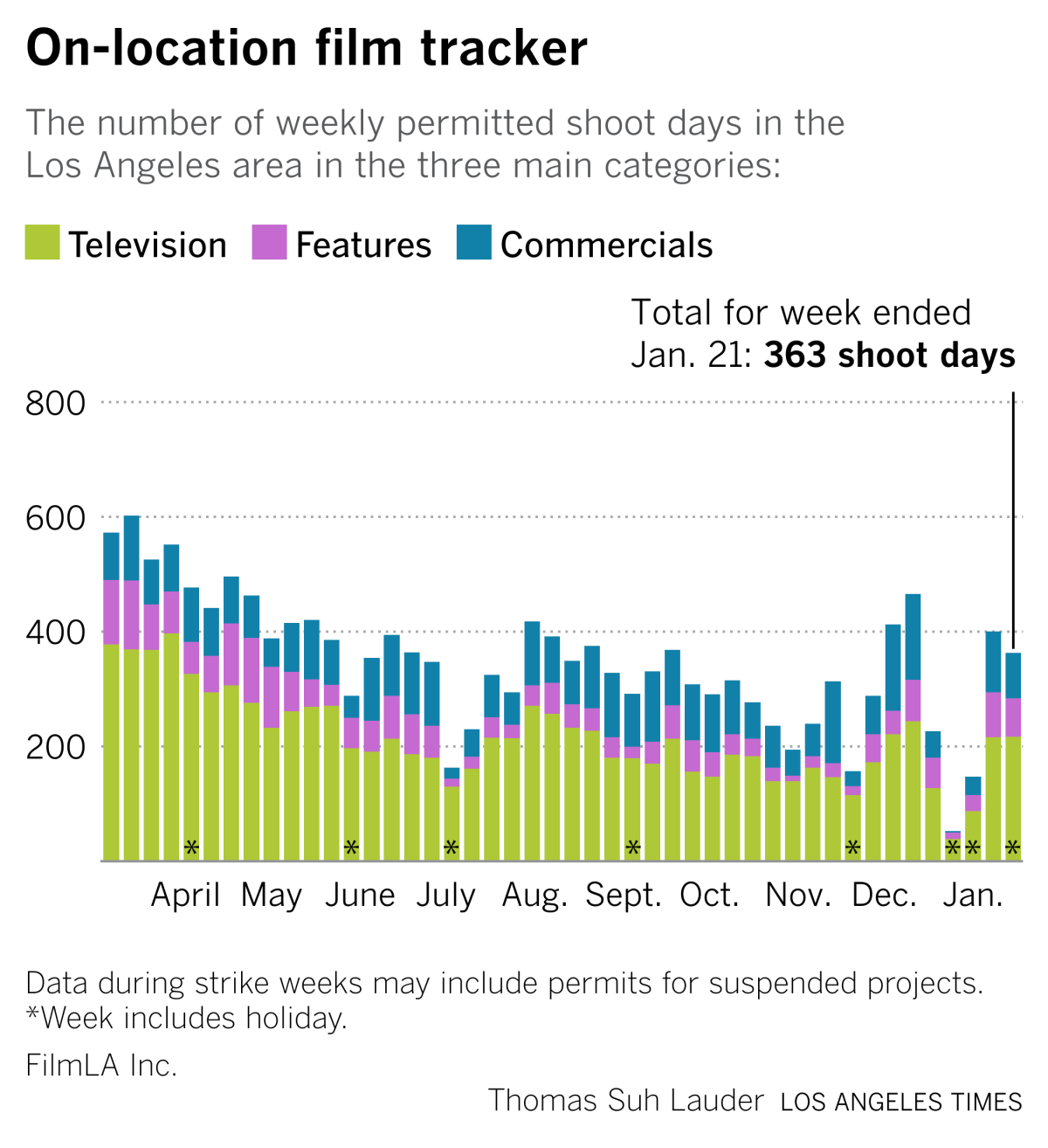Is Hollywood marketing ‘hiding’ musicals like ‘Wonka’ and ‘Mean Girls?’ It’s complicated

Thanks to Matt Brennan for taking the lead on our Wide Shot daily editions from the Sundance Film Festival in Park City, Utah. Now, back to our regularly scheduled programming.
Since the introduction of sound to motion pictures with “The Jazz Singer” in 1927, musicals have been among the defining genres of cinema, as important as westerns and war films.
And yet, in recent months, several Hollywood studios have been accused of playing peek-a-boo with their movies in which characters spontaneously break out into song.
Do a quick Google search, and you’ll find references to moviegoers being stunned that Paramount’s new “Mean Girls” film, based on the Broadway smash that was adapted from the 2004 Tina Fey-penned Lindsay Lohan comedy of the same name, had a bunch of musical numbers in it.
You’ll find critics wondering why the trailers for Warner Bros.’s “Wonka,” starring Timothée Chalamet as Roald Dahl’s off-kilter chocolatier, and the same studio’s “The Color Purple,” featuring outstanding singer Fantasia Barrino, seemed coy about the fact that they were full-blown musicals.
This observation may be a tad overblown.
Marketing campaigns are multifaceted and have reach to the broadest possible audience, which is no small feat in today’s highly competitive theatrical film business. Audience members who saw the multitude of promotional materials and cast appearances for either “Wonka” or “The Color Purple” would certainly have been exposed to hints of what was in store.
The official trailer for “Wonka” had flashes of dancing, including shots of high-stepping chorus lines, along with Hugh Grant’s Oompa Loompa teeing up a certain famous number. A television spot released in November showcases Chalamet’s rendition of “Pure Imagination.” Beyond that, the 1971 “Willy Wonka & the Chocolate Factory” was itself chock full of tunes, so the prequel’s song-and-dance aspect shouldn’t shock anyone.
And Warner’s official “The Color Purple” promos featured dance sequences and Barrino belting out “I’m Here” from the Tony-winning show. But no, the studio wasn’t totally leading with the musical nature of the film.
Why not advertise musicals more explicitly as musicals? Is the thinking that they are too niche? Too old-fashioned? Do studios fear reprising past flops, like “In the Heights,” “Cats” and “Dear Evan Hansen?” Maybe a little bit of all of the above?
The reasoning is more complicated than it sounds. Broadway fans may cry foul, but each film is different and needs to be marketed accordingly. Studio insiders told the Wide Shot that the priority of the early marketing for “Wonka,” for example, was to emphasize the story and the characters and get audiences acquainted with Chalamet’s version of the top-hatted inventor. Given the wide cultural fondness for Gene Wilder’s famed take, that would be no easy task.
One factor, according to marketing experts who spoke anonymously, could be that the original film versions of “The Color Purple” and “Mean Girls” were not musicals, unlike Broadway-born creations such as, say, “Les Misérables” or “Mamma Mia!,” which were clearly and successfully marketed as such.
To reach the largest audience, studios tend to sell movies by showing viewers what they already know they like. You sell “Mean Girls” by selling “Mean Girls,” emphasizing the biting humor and larger-than-life characters.
On the flip side, Disney’s recent hit remake of “The Little Mermaid” (most definitely a musical) wasn’t at all hesitant about having Halle Bailey sing “Part of Your World” in its advertisements. And why would it be? People go wild for that song. Is there any chance that Universal Pictures, when it markets Jon M. Chu’s upcoming “Wicked” adaptation, would shy away from the high notes of “Defying Gravity” in its trailer and television spots? I doubt it.
When studios go that far, it can backfire. Hollywood saw a major backlash in 2007, when audiences were baffled by the on-screen singing in “Sweeney Todd: The Demon Barber of Fleet Street,” which was an adaptation of a Stephen Sondheim and Hugh Wheeler musical and not just your “normal” Tim Burton movie (if such a thing exists).
Are Hollywood’s marketing tactics working? .
The new “Mean Girls” opened with a solid $33.6 million during the four-day Martin Luther King Jr. weekend in the U.S. and Canada, before sinking 59% in its second weekend, which suggests that Paramount may have been wise to avoid broadcasting its musicality. “The Color Purple” had a promising start when it debuted to a strong $18 million on Christmas Day by courting largely Black audiences, but it swiftly faded for a domestic total of $59.7 million.
But “Wonka” is a straight-up hit. The film has grossed $534 million worldwide, including $188 million in the U.S. and Canada, after opening to $39 million domestically in mid-December. That’s an impressive run, making clear that word-of-mouth was not hampered by any revelation that there were lots of songs. Perhaps in this case, hiding the musicality was unnecessary, though it’s hard to see that it hurt.
Marketing isn’t everything. Sometimes the movie itself has to carry the day, and good buzz is a powerful force, especially for family-friendly films.
When it comes to original movie musicals, box office pundits love to point out the gangbusters success of 2017’s “The Greatest Showman,” which looked like an utter bomb when it launched to $8.8 million. It ended up grossing a staggering $174 million domestically and $439 million globally. 20th Century Fox may have had a tough time marketing the movie for opening weekend, but audiences found it and embraced it anyway. Of course, that was an unusual example, and the film business has changed significantly since then.
The musical genre will face another test this year with another movie from Warner Bros., Todd Phillips’ super-villain sequel, “Joker: Folie à Deux,” featuring Lady Gaga as Harley Quinn alongside Joaquin Phoenix’s mad clown Arthur Fleck. Will DC fans accept a dark, gritty musical, even if it’s covered in evil clown makeup? If Warner Bros. and Phillips want to be extra brave, they’ll give us a showstopper in the teaser trailer.
You’re reading the Wide Shot
Ryan Faughnder delivers the latest news, analysis and insights on everything from streaming wars to production — and what it all means for the future.
You may occasionally receive promotional content from the Los Angeles Times.
Stuff we wrote
L.A. Times to lay off at least 115 people in the newsroom. The L.A. Times began laying off at least 115 newsroom employees Tuesday. Owner Dr. Patrick Soon-Shiong said the cuts were necessary to trim heavy financial losses.
Netflix film chief Scott Stuber will leave the streaming giant to start his own firm. Stuber is leaving the streamer in mid-March. Bela Bajaria was upped to chief content officer last year, making her his boss. His division was known for movies, including “The Gray Man” and “The Irishman.” Netflix on Tuesday said it added 13 million subscribers during the fourth quarter. It also secured a deal to stream WWE’s “Raw.”
You want to break into the video game industry? Here’s how. Despite roughly 10,000 layoffs globally since the beginning of 2023, the video game business continues to grow. Experts discuss opportunities and how to make it in this competitive field. Speaking of video game layoffs, L.A.-based Riot Games is cutting 530 jobs.
Meet the Netflix executive responsible for your recommendations. Netflix Chief Product Officer Eunice Kim discusses how the streamer recommends content and how the platform will evolve as other types of content like games are added.
Former Fox News political director Chris Stirewalt lands a Sunday show on NewsNation. “The Hill Sunday With Chris Stirewalt” will debut March 3 on Nexstar’s cable news channel. Stirewalt was on the Fox News decision desk that called Arizona early and accurately for Joe Biden.
Will a post-strike Sundance see a deal surge? What insiders are saying about the indie film market. With talent and film executives gathered in Park City for the 40th Sundance Film Festival, a belt-tightened Hollywood coming out of two historic strikes will consider how much it’s willing to pay for its festival favorites.
The docket:
- Disney settles lawsuit with film financier TSG Entertainment.
- Diddy ‘voluntarily dismisses’ racial discrimination lawsuit against liquor giant Diageo.
- Woman accuses James Dolan, Harvey Weinstein of assault, sex trafficking.
Number of the week

It was a big morning for “Oppenheimer” and Universal Pictures as Christopher Nolan’s Atomic Age historical drama pulled in a leading 13 nominations for the 96th Academy Awards, including best picture, director and a number of craft and acting categories.
Yorgos Lanthimos’ “Poor Things” represented for Searchlight with 11 nods, followed by Martin Scorsese’s “Killers of the Flower Moon,” with 10, including a historic nomination for Lily Gladstone in lead actress.
Greta Gerwig’s “Barbie” from Warner Bros. earned eight nominations, including best picture, but missed in director and lead actress (Gerwig and Margot Robbie snubbed!) The highest grossing film of the year did earn spots for Ryan Gosling in supporting actor and America Ferrera in supporting actress.
Other best picture nominees were Bradley Cooper’s “Maestro” (Netflix), Cord Jefferson’s “American Fiction” (Orion Pictures/Amazon MGM Studios), Alexander Payne’s “The Holdovers” (Focus Features), Justine Triet’s “Anatomy of a Fall” (Neon), Celine Song’s “Past Lives” (A24) and Jonathan Glazer’s “The Zone of Interest” (A24).
Full nominations list here.
Film shoots
“Film and TV production activity in the Los Angeles area is still remarkably low in the immediate aftermath of the Hollywood writers’ and actors’ strikes, which brought filming to a near standstill during much of 2023,” writes Christi Carras.
“Fourth-quarter production levels (tracked from Oct. 1 to Dec. 31) were down 36.4% compared with the previous year, according to FilmLA, which attributed the decline to lingering effects of the overlapping WGA and SAG-AFTRA walkouts. FilmLA is a nonprofit group that handles film permits for the city and county.”
Here are the latest weekly numbers for on-location film permits in the Los Angeles area, according to FilmLA.

Finally ...
RIP, Peter Schickele, the musician and satirist best known for creating the character P.D.Q. Bach, a fictional composer and son of J.S. Bach. Here’s a profile from the archives of “CBS Sunday Morning.”
The Wide Shot is going to Sundance!
We’re sending daily dispatches from Park City throughout the festival’s first weekend. Sign up here for all things Sundance, plus a regular diet of news, analysis and insights on the business of Hollywood, from streaming wars to production.
You may occasionally receive promotional content from the Los Angeles Times.




